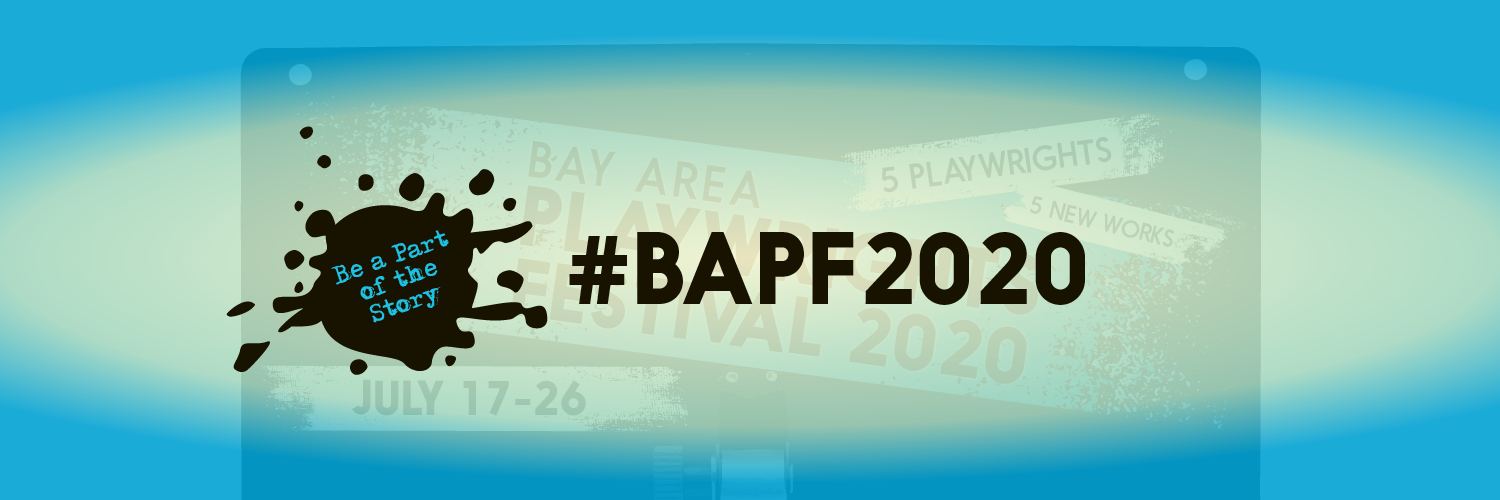11 Sep The Making of a Virtual Play Festival
Moving BAPF Online
Opportunities in the Challenges
by Executive Artistic Director Jessica Bird Beza
Playwrights Foundation has been producing the Bay Area Playwrights Festival (BAPF) for 43 years, but this summer it was like it was our 1st and 43rd Festival at the same time. When I started at Playwrights Foundation as Executive Artistic Director in October 2019, I never dreamed that six months later we would all be quarantined in our homes for the inevitable future forcing us to innovate our craft. We had a choice, we could mourn the way of life that was left behind, or we could look to the opportunities that existed in this new world that help us serve our mission more deeply. We chose the latter. We definitely faced our array of challenges, but the opportunities gained outweigh them all and built community during a unique time that none of us will forget. I wanted to share some of what we learned with you.
Not only was this our first online BAPF but it was my first as Executive Artistic Director. This may seem like a setback, but I actually think it served us in the process. I could look at things with fresh eyes and ask “how or why do we do this?” then shift to “what will that look like this year or do we need this?” I believe this moment has brought opportunities for new leaders, like myself, because we can’t do what has been done before because that way doesn’t exist. We have to look forward and innovate to answer “what will this be now?”
There were a few values that were our guiding light through our journey and I want to share with you our top two: 1.) Serve the playwrights’ needs and 2.) Build authentic community.
At Playwrights Foundation, serving our playwrights’ needs to the best of our ability is our number one priority. At the beginning of the BAPF process each playwright was intricately involved in putting together their team. In this online world, we still remained committed to hiring Bay Area talent but were able to widen our lens and hire people to best serve our playwrights from all over the world if needed. An opportunity that proved useful for Final Boarding Call whose cast came from the Bay Area, Chicago, Taiwan, and Hong Kong. Stefani, the playwright, was able to expand the Mandarin and Cantonese because she had actors that were fluent in ways she hadn’t had before with readings in New York. We also had the opportunity to work with Bay Area actors and directors that normally were booked during this time, but available, due to other shows being cancelled which widened the net for putting together the right artists for each project. There was a deep gratefulness that all of us had to be bringing to life these stories in a time when so much had been cancelled.
Honestly, none of us knew what to expect. Would this be valuable or would we all be missing the way it used to be? In the end, each playwright was surprised by how much they rewrote and how valuable the process was. Some of the things that the playwrights cited as helpful were things like: being able to rewrite scenes during rehearsal while listening to the actors instead of waiting until after rehearsal; gaining commute time as writing time; and having a skilled team that could dive deep into the work quickly. Each playwright also had a content expert that they worked with that helped them deepen specific aspects of their play. We gathered experts from the Bay, Portland, Washington DC, and even the first Latina delegate from West Virginia. The playwrights all cited this opportunity as one of the most valuable that led them to some of their deepest rewrites.
We took careful care in building authentic community between our artists and audience. What does that even look like online? We realized early on that all of the informal moments that build relationships don’t exist in this world unless you create space for them. For example, the conversations before or after rehearsal or a reading won’t naturally happen, or how do you hear an audience’s response?
We came together for the first time as a group during our artist retreat where each play’s artistic teams came together with staff for a pre-retreat before going into rehearsals. Normally, the artists gather for three days of packed activity in a beautiful remote location. This year, we gathered across four time zones from the West to East Coast all the way to Hong Kong from our homes on Zoom. How do you even schedule time together? At some point, we were all either getting up at 7 am or staying up until 11 pm. We gathered in four different ways together: 1.) collective group time where we created values, talked about the mechanics of an online Festival, and the playwrights read the first act of their play; 2.) affinity time with playwrights/directors/dramaturgs/fellows; 3.) individual team time; and 4.) non required community hours hosted by each team to build relationships. I was the most curious to see how the community hours would work. Would people show up for non-required times to get to know one another and talk about the plays? The community spaces ended up being some of the most fruitful and intimate spaces where folks talked about things in their personal lives that related to the plays, listened to good music, or shared struggles. Playwrights learned about their work through the personal contributions and it left imprints on their work. There’s something beautiful that happens in Zoom, where everyone takes up the same amount of space on the screen and you are all in the same conversation allowing folks to have a voice or participate in ways that they might not in a room. By the end of the retreat, the vulnerability and power witnessed as the playwrights read their own work that led to intimate conversations filling our yearning for community and togetherness in a time of separation, led to a deeply moving experience that showed us all that it is possible to connect with one another across the vast distance. This stayed with us into our rehearsal rooms as each team created their own community, and we navigated translating our craft into this new world.
The last character added to a play is the audience, but if we can’t hear them laugh, cry, sigh, or applaud, how do they participate? How do we know what they are thinking? How does a playwright learn about their play? We had conversations with the playwrights and dramaturgs about what they would want to learn and how and decided to develop an option for using the chat throughout the play and we encourage folks to respond in the moment with their reactions. Initially there were valid concerns around what might be said in the chat box, whether it would be distracting, or if side conversations would happen. To solve this we crafted a moderated conversation with guidelines shared before the reading and reminded throughout. Audience members introduced themselves as they “entered” the room, and we learned that people were gathering with us from all over the world across the United States to Hong Kong, Germany, and Taiwan. You felt like you were watching in community with others and gaining a shared experience as you saw folks expressing their reactions in the chat. It was more moving than I anticipated, creating a deeper community than I thought was possible. And you could actually see what the audience was feeling. Not the same as in person where you hear reactions, but in a different way. One in which you get to see specific reactions inside people’s heads instead of guessing. The playwrights, with their dramaturgs, also created questions for the audience that were shared either in a Google Form or asked in the chat and answered live post reading, creating a talk back atmosphere where the audience and playwright could learn from one another. By adding these elements, we felt connected to the online audience, creating a sense of ‘being in the same room’ – something we didn’t know would be possible until we tried.
Being online deepened our mission to serve as a launchpad for emerging playwrights by greatly increasing the access of those that could attend the readings. We had a 50% increase in ticket sales and a 225% increase in attendance of theatre professionals who may be interested in supporting the playwrights’ work. Our panels around the Festival gained thousands of views and allowed us to partner with speakers across the country and dig into deep conversations like Decolonizing New Play Development that will live on past the live conversation.
Although we deeply miss gathering together in person, this summer we discovered more tools in our toolbox for new play development that in some ways has advantages over gathering in person. Is one better than the other? I would say they are different and can serve different purposes. Will online theatre be a thing of the past once the pandemic subsides? I hope not. I truly believe that we were given an opportunity, difficult as it may be, to transition our field online to create wider access and allow for national and worldwide collaborations in ways we have never thought possible before. It would be a shame to go back to the way we operated before. We have widened our toolbox and how can we continue to use those tools to more deeply support the work we do and create wider access for participation. My hope is to always have an online component to the Festival. There are many things we still need to figure out to make that happen, but we made it this far. I admit that sometimes the future can seem grim, but I remind myself of the opportunities we have in this moment, and I’m excited to see where our industry goes next and how we rebuild together.



No Comments